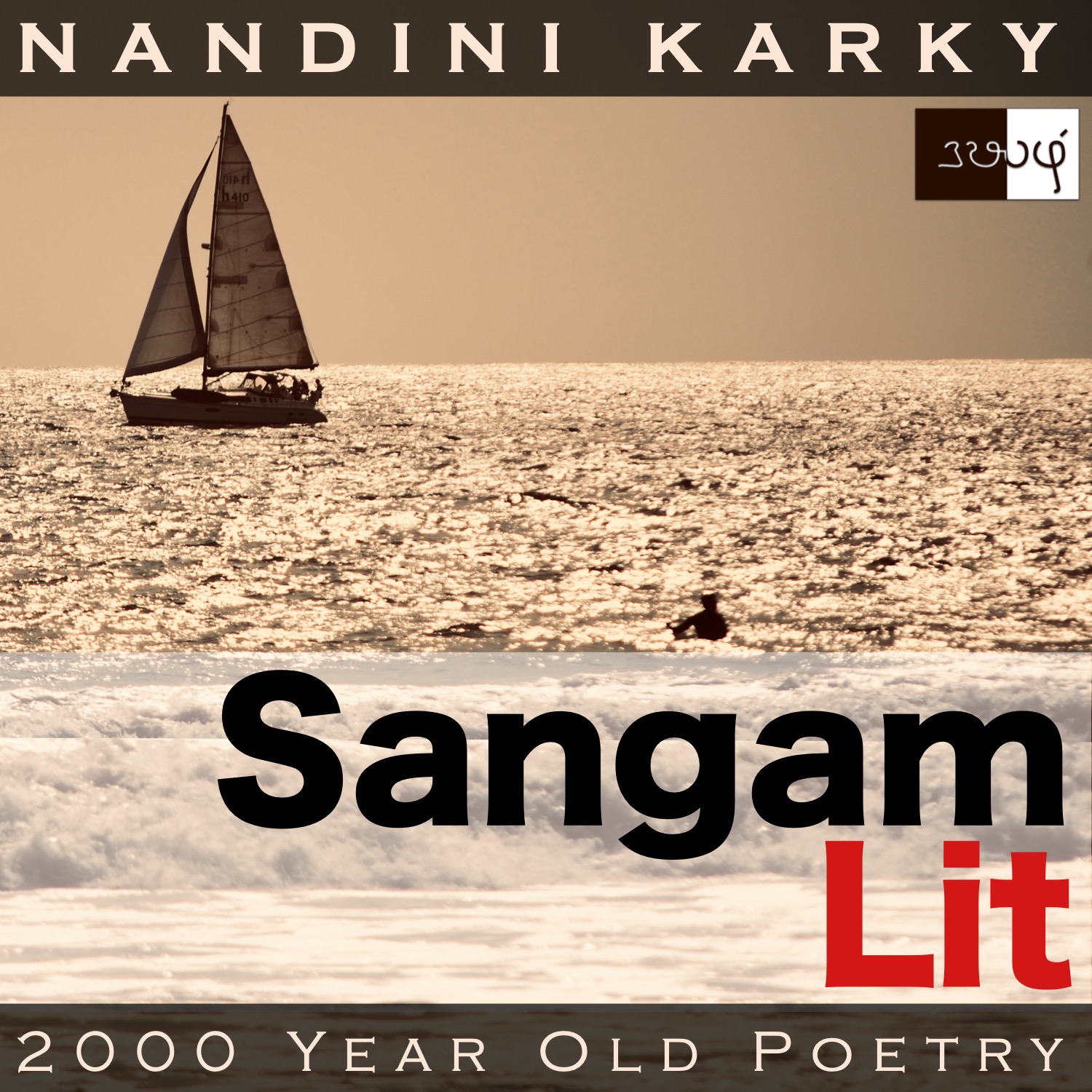Podcast: Play in new window | Download
Subscribe: Apple Podcasts | Spotify | Amazon Music | Android | iHeartRadio | TuneIn | RSS | More

In this episode, we hear the echoes of the past in Sangam literary work, Natrinai 30, written by Kotranaar, set in the landscape of ‘Marutham’ or the agricultural regions. This poem is a reply by the lady’s confidante to the man, revealing his actions to the lady that he was attempting to hide.
கண்டனென்-மகிழ்ந!-கண்டு எவன்செய்கோ?-
பாணன் கையது பண்புடைச் சீறியாழ்
யாணர் வண்டின் இம்மென இமிரும்,
ஏர்தரு தெருவின், எதிர்ச்சி நோக்கி, நின்
மார்பு தலைக்கொண்ட மாணிழை மகளிர்
கவல் ஏமுற்ற வெய்து வீழ் அரிப் பனி-
கால் ஏமுற்ற பைதரு காலை,
கடல்மரம் கவிழ்ந்தெனக் கலங்கி, உடன் வீழ்பு,
பலர் கொள் பலகை போல-
வாங்கவாங்க நின்று ஊங்கு அஞர் நிலையே.
There was a faint sound of music afar on reading the word ‘சீறியாழ்’ meaning ‘a small harp’. Then, there was the resounding sound of the raging waves meeting the phrase ‘கடல்மரம் கவிழ்ந்தெனக் கலங்கி’ meaning ‘tearful seeing a shipwreck’. Let’s zoom on to the word ‘கடல்மரம்’, which refers to a ‘கப்பல்’ or a ship. If you were to break this word and attempt a literal translation, it would mean a ‘sea-tree’. One can say, that it was called so, because ships were made of wood in ancient days but I’d like to think that just like how a tree is the protector and provider of life on land, so is the ship on sea and hence, the name. Finally, I smiled at the word ‘வாங்கவாங்க’ because you will hear this ‘வாங்க! வாங்க!’, when you attend events or visit people in their homes here. This is a hearty welcome from the host to visitors saying, ‘Please come! Please come!’ Would it mean the same in this verse or something else entirely? Let’s find out.
Hearing the interpretations of those who have visited before us, we learn that this poem is said as a response by the lady’s confidante to the man, who insists that he has not visited the courtesans. She says to him, “I did see, lord of the fields! In that street you were coming by, where the singer’s flawless harp resounds like a fertile honeybee, yearning for the garland around your neck, those bejewelled courtesans with tear-stained eyes, seemed to be in pain at being parted from you. Imagine the scene where the storm rages and tears apart a ship, wherein those shipwrecked sailors seeing a piece of wood adrift, rush towards it and each of them pull it to this side and that. Like that, I saw you being pulled on all sides by those courtesans and perceived your poor, troubled state. But, what could I do?” Through this verse, the lady’s confidante indirectly conveys to the lady that the man indeed had been away at play with the courtesans and is in fact, not speaking the truth.
Let us travel beyond the verse to hear and see new things from the past. First, let’s answer the question of ‘வாங்கவாங்க’. In this verse, it means something different from the modern Tamil welcome message. Here, it means to receive in one’s hands and pertains to the act in which the man was pulled left and right, into the hands of the surrounding courtesans. Next, let’s board the ship described in the poem, holding on to our seats for we know it’s about to be shipwrecked. This casual reference to a ship as a simile from a poem written more than two thousand years ago, is a clear indication that the ancient Tamils were a seafaring people, used to the ways and vagaries of the oceans. Perhaps, they travelled to ancient Rome and Greece, as well as the islands in the Indo-Pacific ocean. In fact, according to the historian Sivagnanam Balasubramani, otherwise known as ‘Orissa Balu’, the word ‘Thamizhar’ comes from ‘Thirai Meelar’, which means ‘people who were expert seafarers’, sailors who could venture into the vast spaces of the ocean and return safely to land. Sailing on this ship with the words ‘பாணன்’ and ‘சீறியாழ்’ shining brightly on my ancient map, I ended up in ‘யாழ்ப்பாணம்’ in Sri Lanka. Let me share with you, how this came to be. The word ‘பாணன்’ pertains to ‘a musician’ in ancient times. They were adept at playing different kinds of ‘யாழ்’ or the harp. The story goes that an ancient king, impressed by the harp-wielding skill of a ‘Paanan’, gifted a region in the northern tip of Sri Lanka then called as ‘Manatri’. In time, this came to be called as ‘Yazhpaanam’ and the entire region took on the same name. I stood stunned at the end of this voyage that took me from an ancient Sangam poem into the seas and into the musical past of ‘Yazhpaanam’. Perhaps, if we listen hard enough, we can hear those ancient Tamil singers and their harps, sounds rising in a sublime celebration of art and peace!




Share your thoughts...